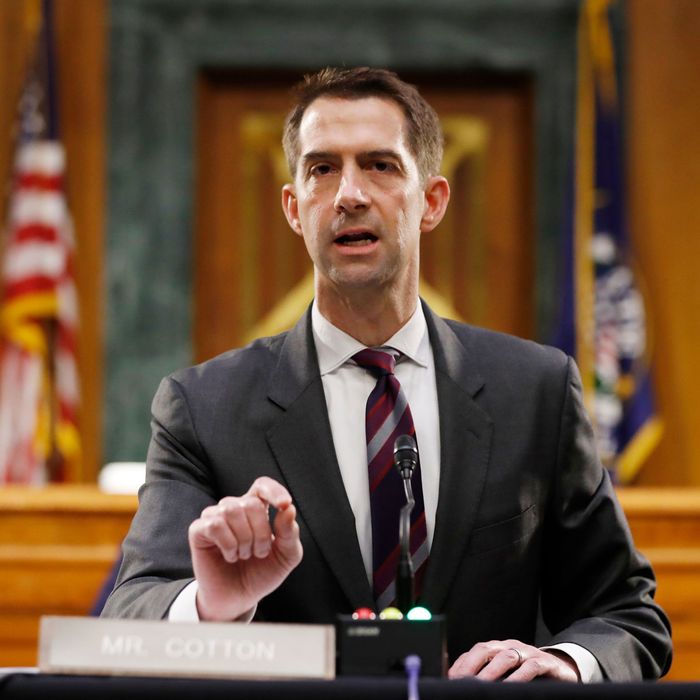Tom Cotton’s Oh-So-Principled Case for Denying D.C. Representation
Tom Cotton #TomCotton


Photo: Andrew Harnik/AP/Shutterstock
Last month, President Trump dismissed statehood for the District of Columbia on the blunt grounds that giving political representation to its citizens would mean adding two more Democrats to the Senate. “You mean District of Columbia, a state?,” he scoffed. “Why? So we can have two more Democratic — Democrat senators and five more congressmen? No thank you. That’ll never happen.”
A key difference between Senator Tom Cotton and Trump is that, while his thinking runs along essentially the same lines, Cotton aspires to intellectual respectability. He follows the pro-Trump Republican habit of translating impulses and self-interest into the language of principle. And so Cotton delivered a speech against D.C. statehood offering what Cotton purported to be nonpartisan arguments for disenfranchising Washington’s 700,000 residents.
There are two (small-d) democratic arguments for D.C. statehood. The narrow argument is that American citizens deserve equal political representation, and there is no reason to subject D.C. residents to taxation without representation. The broader argument is that the Senate as a whole massively overrepresents white people at the expense of minorities, because small states tend to be whiter than large ones. The disparity is large: Nationwide, every million white people is represented by 0.35 senators, as opposed to 0.26 for every Black American, 0.25 for Asian-Americans, and just 0.19 senators for every million Hispanic Americans.
D.C. statehood, which would shrink the federal district to just the areas around Congress and the White House while making its residential spaces a state, would solve the first problem, and only slightly alleviate the second. Even giving Washington, D.C., statehood would still leave a Senate that gives far more weight to heavily white states:
Graphic: Data for Progress/Vox
Cotton addresses neither concern. On the first point, he suggests Washington could join with Maryland if it wants representation in Congress. (This would give Democrats another seat in the House, but no additional senators.) But Cotton doesn’t give any indication he’d accept such a solution.
Indeed, much of his speech is given over to arguments that could also be repurposed into arguments against adding Washington’s residential neighborhoods to Maryland. Cotton warns that allowing the capitol to be surrounded by a state government would pose a mortal danger. Cotton famously wrote an op-ed just weeks ago insisting cities across the country would plunge into anarchy without the army serving as an occupying force.
The complete failure of this prediction has not embarrassed him, and his speech about Washington fearfully invokes the safety of the capitol as if he were talking about the Green Zone in Baghdad circa 2004. Cotton warns that the new federal district would rely on the Democrats’ new state for many basic utility, not just power but water, sewage, and telecommunications. (This would also be true, of course, if those areas were part of Maryland.) Citing the “riots” earlier this month — which were miniscule in comparison with peaceful demonstrations — Cotton raises the specter of the Civil War, when “our government faced imminent encirclement by hostile forces.”
It is nice to see Cotton, who recently spoke out in defense of memorializing the traitors in the last Civil War, implying that he wants the Union to win if there’s another one. Still, in the highly unlikely event of another civil war, the boundaries of the federal district probably not going to play an important role in the outcome.
Cotton ignores the broader representational case for D.C. statehood, though his argument hint as to why Republicans see the Senate’s overrepresentation of white people as not only convenient but morally correct.
“Yes, Wyoming is smaller than Washington by population, but it has three times as many workers in mining, logging, and construction, and ten times as many workers in manufacturing,” he argues. “In other words, Wyoming is a well-rounded working-class state.” Why should should people’s political rights depend on their participation in the resource-extraction economy? Is it because people who work in those fields are … well, hold that thought.
Cotton also warns that the newly independent state could not be trusted to elect responsible leaders concerned with public safety. “Would you trust Mayor Bowser to keep Washington safe if she were given the powers of a governor?,” he asks. “Would you trust Marion Barry?”
One might ask why we would trust the people of Arkansas with full statehood when they elected a senator so panicky about demonstrations against the murder of a black man that he hysterically called for troops to be brought into the streets. One might also wonder why Cotton is so entrusting of Donald Trump, given … well, everything Trump has done. But Cotton did not explain what it is about D.C. voters that makes them inherently dangerous with the powers of state government. His premise about which groups of Americans can be trusted with equal political representation, and which cannot, comes through perfectly clear.
Analysis and commentary on the latest political news from New York columnist Jonathan Chait.
Terms & Privacy Notice By submitting your email, you agree to our Terms and Privacy Notice and to receive email correspondence from us.